|
|
|
Sort Order |
|
|
|
Items / Page
|
|
|
|
|
|
|
| Srl | Item |
| 1 |
ID:
167695
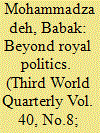

|
|
|
|
|
| Summary/Abstract |
Saudi politics is commonly portrayed as reflecting a system of centralised personal rule in which decision-making power trickles down from the tightly knit power circles within the House of Saud. In contrast, this paper draws attention to the empowerment of quasi-autonomous state organisations in Saudi Arabia as a result of state transformation and regional integration. At its most extreme, state transformation in Saudi Arabia has created institutional and regulatory enclaves with vested interests and areas of competence that cross Saudi borders. This paper illustrates the foreign policy ramifications of transformed statehood in Saudi attempts to further Gulf regional integration in the context of the Gulf Monetary Union project.
|
|
|
|
|
|
|
|
|
|
|
|
|
|
|
|
| 2 |
ID:
122972
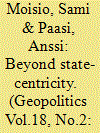

|
|
|
|
|
| Publication |
2013.
|
| Summary/Abstract |
This paper scrutinizes the challenges which scholars face when examining the interconnections between the state and geopolitics in the purported "transnational world". By discussing the relational perspective which "opens" the traditional state-as-a-monolith centric view of geopolitics, the paper sets a foundation for the present special section on the changing geopolitics of state spaces. The paper proceeds by first reflecting on the move from geopolitically "closed" to more open state territories, and then considers some of the ways the state has been examined in spatially sensitive research with respect to geopolitical scholarship. Finally, the paper maps out possible horizons for forthcoming studies on the geopolitics of state spaces.
|
|
|
|
|
|
|
|
|
|
|
|
|
|
|
|
| 3 |
ID:
167688
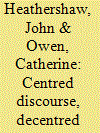

|
|
|
|
|
| Summary/Abstract |
This paper challenges dominant understandings of ‘rising powers’ by developing a decentred, relational account of Russia and China in Central Asia. We ask whether Moscow and Beijing’s regional integrative strategies do not guide, but rather are led by, everyday interactions among Russian and Chinese actors, and local actors in Central Asia. Rising powers, as a derivative of ‘Great Powers’, are frequently portrayed as structurally comparable units that concentrate power in their executives, fetishise territorial sovereignty, recruit client states, contest regional hegemony and explicitly oppose the post-1945 international order. In contrast, we demonstrate that the centred discourse of Eurasian integration promoted by Russian and Chinese leaders is decentred by networks of business and political elites, especially with regard to capital accumulation. Adopting Homi K. Bhabha’s notion of mimicry (subversion, hybridity) and J. C. Scott’s conception of mētis (local knowledge, agency), and using examples of Russian and Chinese investments and infrastructure projects in Central Asia, we argue that in order to understand centring discourse we must look to decentring practices at the periphery; that is, rising power is produced through ongoing interactions between actors at the margins of the state’s hegemonic reach.
|
|
|
|
|
|
|
|
|
|
|
|
|
|
|
|
| 4 |
ID:
167690


|
|
|
|
|
| Summary/Abstract |
This article seeks to challenge the conception of the Russian state as being centred on Vladimir Putin by looking at the actors implementing Russia’s foreign policy in its near abroad. In particular, it explores the activities of curators (kuratory), a term applied in Russia to describe officials tasked with making things work often bypassing, and sometimes competing with, formal institutions. Following the state transformation framework, the argument put forward in the article is that curation (kuratorstvo), as a practice of coordination and control in Russia’s system of governance, can be seen as a manifestation of fragmentation and internationalisation of Russia’s foreign policy making. The empirical basis for this article is a case study of Russia’s policy towards Abkhazia, which Russia officially recognised as a sovereign state in 2008. This article addresses the involvement of curators in their attempts to exert political influence as an expression of fragmentation as well as emerging institutionalised curation in development assistance as a part of internationalisation.
|
|
|
|
|
|
|
|
|
|
|
|
|
|
|
|
| 5 |
ID:
136709
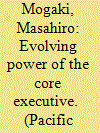

|
|
|
|
|
| Summary/Abstract |
This article addresses the transformation of the state by exploring the case of Japan’s ICT regulation between the 1980s and 2000s prompted by the challenge to the state after the 1980s. It sets out to challenge the dominant pluralist and rational choice literature in Japanese politics that takes an elitist perspective with the concept of the core executive, referring to the body of statist literature, that employes data drawn from the interview of elites. What emerges from this study is a variation on state transformation with a fluid change of power within the core executive in ICT regulation. This can be understood as a dynamic reconstitution process of the Japanese state in response to the challenges both sector-specific and beyond. Mobilised by the change of power, the reconstitution of the Japanese state has transformed the developmentally-oriented characteristic of the Japanese state led by civil servants. Elsewhere, by focusing on the state at a macro level and power relations within the core executive, this article reveals the dominance of the core executive in ICT regulation. It concludes that the Japanese state has retained dominance over society through its reconstitution mobilised by the core executive within which the fluid change of power has occurred between actors.
|
|
|
|
|
|
|
|
|
|
|
|
|
|
|
|
| 6 |
ID:
178854
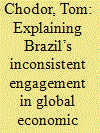

|
|
|
|
|
| Summary/Abstract |
The growing significance of rising powers has led to debates about their role in global economic governance, with expectations they will either challenge its neoliberal agenda or become ‘responsible stakeholders’. However, the reality is that the role of rising powers is inconsistent: in some areas they accept the neoliberal consensus, while in others they contest it. This article utilises the State Transformation Approach to explain the inconsistent positions of Brazil: its support for free trade at the WTO, and its contestation of capital account liberalisation at the IMF, followed by a reversal and acceptance of it after 2014. The article argues this inconsistency can only be understood by analysing the domestic context of foreign policymaking, particularly the fragmentation of its state and the balance of forces in its political economy. In relation to trade, the fragmentation of the state enabled the agro-export sector to dominate formulation of policy. In finance, on the other hand, the greater autonomy of policymakers, and a balance of forces favouring intervention enabled the promotion of capital controls. However, this was a contingent outcome of socio-political struggles, and once the balance of forces shifted from 2014, financial forces reasserted themselves provoking a return to the orthodoxy.
|
|
|
|
|
|
|
|
|
|
|
|
|
|
|
|
| 7 |
ID:
077330
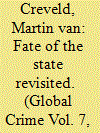

|
|
|
|
|
| Publication |
2006.
|
| Summary/Abstract |
The State, which during the three and a half centuries since the Treaty of Westphalia (1648) has been the most important and the most characteristic of all modern institutions, appears to be declining or dying. In many places, existing states are either combining into larger communities or falling apart; in many places, organizations that are not states are challenging them by means fair or foul. On the international level, we seem to be moving away form a system of separate, sovereign, legally equal, states towards less distinct, more hierarchical, and in many ways more complex political structures. Inside their borders, it seems that many states will soon no longer be able to protect the political, military, economic, social and cultural life of their citizens. These developments are likely to lead to upheavals as profound as those that took humanity out of the middle ages and into the modern world. Whether the direction of change is desirable, as some hope, or undesirable, as others fear, remains to be seen.
|
|
|
|
|
|
|
|
|
|
|
|
|
|
|
|
| 8 |
ID:
131423
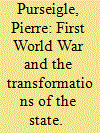

|
|
|
|
|
| Publication |
2014.
|
| Summary/Abstract |
Scholars of the First World War have long recognized the critical role played by the state in leading, organizing and managing the mobilization of belligerent societies, and the state's transformations have testified to the impact of industrialized warfare. Since the late 1980s, however, the cultural turn that largely accounts for the renewal and dynamism of First World War studies has shifted the emphasis away from the wartime state and its operations. Its study relatively suffered as a result. This article aims to bring the state back into the centre of the historiographical discussion, since its transformations testified to the nature and political impact of industrialized warfare. The article therefore focuses on three critical aspects of the relationship between state and society: the deployment of coercion, the expression of national solidarity and the redefinition of sovereignty. It demonstrates how the logic of mass participation in modern warfare transformed both the contours and the foundations of the state. To do so, the article draws on a renewed engagement with social scientific literature and the sociology of the state in particular.
|
|
|
|
|
|
|
|
|
|
|
|
|
|
|
|
| 9 |
ID:
092133
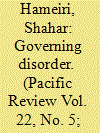

|
|
|
|
|
| Publication |
2009.
|
| Summary/Abstract |
The Australian Federal Police has in recent years become an important actor in both the implementation and design of Australian-led state building interventions in Australia's near region of Southeast Asia and the South Pacific. The article focuses on the recent expansion of the Australian Federal Police as a way of understanding the emergence of a new partly (and strategically) deterritorialized, 'regional' frontier of the Australian state. Within this new frontier, whose fluctuating outlines the Australian Federal Police not only polices but also to a considerable extent shapes and reshapes, as one of the primary expert agencies on identifying and managing transnational security risks, Australian security is portrayed as contingent on the quality of the domestic governance of neighbouring states, thereby creating linkages between the hitherto domestic governing apparatus of the Australian state and those of other countries. This allows for the rearticulation of the problems affecting intervened states and societies - indeed, their very social and political structures - in the depoliticized terms of the breakdown of 'law and order' and the absence of 'good governance', which not only rationalizes emergency interventions to stabilize volatile situations, but also delegitimizes and potentially criminalizes oppositional politics. The Australian Federal Police, however, does more than merely provide justification for intrusive state transformation projects. Its transnational policing activities open up a field of governance within the apparatus of intervened states that exists in separation from international and domestic law. The constitution of such interventions 'within' the state leaves intact the legal distinction between the domestic and international spheres and therefore circumvents the difficult issue of sovereignty. As a result, police and other executive-administrative actors obtain discretionary ordering powers, without dislodging the sovereign governments of intervened countries.
|
|
|
|
|
|
|
|
|
|
|
|
|
|
|
|
| 10 |
ID:
121854
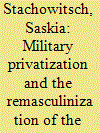

|
|
|
|
|
| Publication |
2013.
|
| Summary/Abstract |
This article examines the gendered implications of military privatization and argues that the outsourcing of military functions to the private sector excludes women from newly developing private military labour markets, impedes gender equality policies and reconstructs masculinist gender ideologies. This process constitutes a remasculinization of the state, in the course of which the nexus between state-sanctioned violence and masculinity is being reaffirmed. Recent research has introduced the concept of masculinity to the study of the private security sector. Building upon these approaches, the article integrates feminist theories of the state into the research field and evaluates their potential contributions to the analysis of military privatization. In an exemplary case study of the US military sector, this privatization is embedded within debates on the neo-liberal restructuring of the state and addressed as a gendered process through which the boundaries between the public and the private are being redrawn. The implications of these transformations are investigated at the levels of gender-specific labour division, gender policy and gender ideologies.
|
|
|
|
|
|
|
|
|
|
|
|
|
|
|
|
| 11 |
ID:
077331
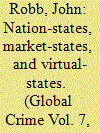

|
|
|
|
|
| Publication |
2006.
|
| Summary/Abstract |
The advent of a global economic and physical superinfrastructure is in the process of transforming terrorism, guerrilla warfare, and the nation-state. A useful model for understanding this process of transformation is Philip Bobbitt's work, "The Shield of Achilles." Bobbitt's work demonstrates that the nation-state is in a difficult and dangerous process of transition to a new form of governance, called the market-state, that is built to withstand and prosper despite the pressures of globalization. This process is complicated by the emergence of a vicious asymmetric competitor, in the form of a virtual state that leverages the huge flows of the global criminal economy, combined with the weakness of the nation-state during its phase transition to the market-state. This essay details the structure of this conflict and provides a scenario for its potential outcome
|
|
|
|
|
|
|
|
|
|
|
|
|
|
|
|
| 12 |
ID:
167691


|
|
|
|
|
| Summary/Abstract |
Foreign policy making in India is typically viewed as highly centralised and dominated by the Prime Minister’s Office and bureaucracy. Yet in 2004, the Congress-Party-led United Progressive Alliance government launched a Composite Dialogue with Pakistan which included a place for Indian think tanks in the Kashmir dispute. We suggest that as India liberalised its economy amidst domestic political upheaval, think tanks were given greater access to domestic and foreign funding and adopted new roles in foreign policy making. In the case of the Kashmir conflict, peacebuilding think tanks were encouraged by the government to engage in cross-border activities that would build constituencies for peace with Pakistan and promote economic cooperation as an incentive for peace. While the government aimed to depoliticise the conflict, these think tanks used this opportunity to draw attention to marginalised perspectives and issues. Peacebuilding think tanks nonetheless faced significant challenges in shaping the peace process because of structural constraints regarding access to resources and lack of autonomy to further their agendas. This reflected resistance within the state to depoliticising a conflict that has long been India’s central national security issue.
|
|
|
|
|
|
|
|
|
|
|
|
|
|
|
|
| 13 |
ID:
167686
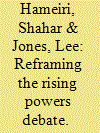

|
|
|
|
|
| Summary/Abstract |
The volume that we introduce breaks with the prevalent tendency in International Relations (IR) scholarship to treat rising powers (such as China, Russia, India and Brazil) as unitary actors in international politics. Although a neat demarcation of the domestic and international domains, on which the notion of unitary agency is premised, has always been a myth, these states’ uneven integration into the global political economy has eroded this perspective’s empirical purchase considerably. Instead, this collection advances the concept of ‘state transformation’ as a useful lens through which to examine rising power states’ foreign policymaking and implementation. State transformation refers to the pluralisation of cross-border state agency via contested and uneven processes of fragmentation, decentralisation and internationalisation of state apparatuses. The volume demonstrates the significance of state transformation processes for explaining some of these states’ most important foreign policy agendas, and outlines the implications for the wider field in IR.
|
|
|
|
|
|
|
|
|
|
|
|
|
|
|
|
| 14 |
ID:
162765
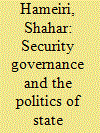

|
|
|
|
|
| Summary/Abstract |
A rapidly growing, self-identified scholarly subfield on “Security Governance” has recently emerged. Its signal contribution has been to explicate the expansion of security governance beyond traditional defense multilateralism to include diverse actors, networked transnationally across multiple scales. However, this literature is predominantly descriptive and evaluative. Lacking an explanatory theory, it struggles to explain security governance outcomes convincingly. This article advances this body of literature by presenting an explanatory theoretical framework, which sees security governance as being produced through struggles over the appropriate scale of governance and the transformation of state apparatuses, shaped by specific state-society and political economy contexts. This framework is used to explain outcomes in the governance of money laundering and terrorist financing in the Asia-Pacific region and in Africa. Contrary to the expectations of Security Governance scholars that states in these regions generally fail to engage in security governance, the case studies illustrate that significant governance innovation has in fact occurred. This innovation is not the result of supranational multilateralization, but of the transformation and partial internationalization of domestic institutions– to an extent determined by local socio-political struggles over governance rescaling. Our framework thus accounts for real world outcomes; explains, rather than merely describes, the functional efficacy of security governance regimes; and enables normative assessment by identifying the winners and losers that emerge out of governance innovation.
|
|
|
|
|
|
|
|
|
|
|
|
|
|
|
|
| 15 |
ID:
175061
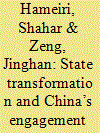

|
|
|
|
|
| Summary/Abstract |
Debates over the implications of China’s rise for global governance have reached an impasse, since evidence exists to support both ‘revisionist’ and ‘status-quo’ intentions. This means that neither is strictly falsifiable and hence the debate, as currently structured, is irresolvable. However, contradictions are explicable if we recognise that China is not a unitary state. Since the beginning of the reform era, its international engagements have been shaped by the uneven transformation – fragmentation, decentralisation and internationalisation – of state apparatuses. Contradictory international actions thus may reflect not top-down strategic direction, but conflicts, disagreements and coordination problems within China’s transformed party-state. Our state transformation approach directs us away from evaluating China’s approach to global governance in toto – whether it is overall a revisionist or status quo power – towards a detailed analysis of particular policy domains. This is because in each issue-area we find different constellations of actors and interests, and varying degrees of party-state transformation. We demonstrate the centrality of state transformation analysis for explaining the co-existence of revisionist and status quo behaviours through the apparently hard test case of nuclear technologies. Even in this ‘high politics’ domain, state transformation dynamics help explain China’s inconsistent international behaviours.
|
|
|
|
|
|
|
|
|
|
|
|
|
|
|
|
| 16 |
ID:
167694
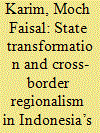

|
|
|
|
|
| Summary/Abstract |
This article examines how the decentralisation and fragmentation of the Indonesian state and resultant central–local dynamics affect cross-border regionalism in Indonesia’s periphery. It argues that cross-border regionalism projects are best understood as sites for scalar contestation over regulatory control between central and local government. Moreover, scalar contestation around cross-border regional projects is characterised by the struggles to control relationships with transnational capital between elites operating at different tiers of the state. When elites at different scales have conflicting interests and strategies, this can cause policy incoherence, inhibiting the development of cross-border regionalism. Conversely, when they align, and intersect with the interests of transnational business, cross-border regionalism can succeed. To illustrate the argument, this article utilises the comparative case studies of the Batam free trade zone and West Kalimantan–Sarawak cross-border cooperation.
|
|
|
|
|
|
|
|
|
|
|
|
|
|
|
|
| 17 |
ID:
143630
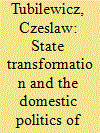

|
|
|
|
|
| Summary/Abstract |
This article challenges the dominant narrative that overlooks the role of domestic factors in Taiwanese foreign aid in favour of politics cast at the cross-Strait and international levels. It examines the emergence and effects of partisan politics on Taipei's foreign aid policies, including aid budgets and the motivation for providing foreign aid. It argues that, rather than the cross-Strait conflict as such, it was contests and rivalries among Taiwan's political parties and government agencies – underpinned by ongoing projects of state building – that shaped the variable objectives, policies and processes of Taipei's foreign aid-giving.
|
|
|
|
|
|
|
|
|
|
|
|
|
|
|
|
| 18 |
ID:
167689
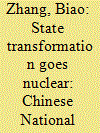

|
|
|
|
|
| Summary/Abstract |
Most of the literature on state transformation focuses on China’s relations with African, Asian and Latin American countries and the National Oil Companies’ overseas expansion to show that China has become fragmented, decentralised and internationalised. This article contributes novel findings by focusing on China’s relations with Europe and the actions of China’s National Nuclear Companies (NNCs). It shows that NNCs, which have become relatively autonomous actors, often pursue their agendas of expansion into Europe without much coordination with, or even in contradiction to, other ministries’ agendas and interests, especially the Ministry of Foreign Affairs. Instead of being orchestrated by the central government, their expansion reflects considerable disorganisation and sometimes undermines China’s official strategy. The article demonstrates this through case studies of NNCs’ involvement in the UK and Romania.
|
|
|
|
|
|
|
|
|
|
|
|
|
|
|
|
| 19 |
ID:
108063
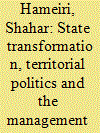

|
|
|
|
|
| Publication |
2011.
|
| Summary/Abstract |
The perceived emergence in recent years of potentially cataclysmic transnational risks has been a growing concern for policymakers and practitioners, as well as an area of considerable scholarly interest. Existing sociological approaches to the study of risk, which have become influential in a range of related social scientific fields, highlight important dimensions of this phenomenon, but are unable to adequately explain why these risk depictions have emerged at this historical juncture. Nor are they capable of providing a systematic explanation for variation in the adoption of risk depictions and related modes of governance in different functional areas and geographic regions. Drawing on the insights of political economy and critical political geography, it is argued that the current preponderance of transnational risk depictions and associated modes of governance should be understood in the context of processes of state transformation, linked to the transnationalisation of finance and production, which challenge the fit between state power and national territorial borders. From this perspective, risk and risk management are mechanisms in a contested process of rescaling, in which governance functions traditionally associated with the national state are shifted to regional or even global modes of governance. Understanding the dynamics of this territorial politics is important for learning about the current and evolving nature of political rule within and beyond the state.
|
|
|
|
|
|
|
|
|
|
|
|
|
|
|
|
| 20 |
ID:
168803
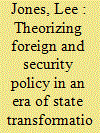

|
|
|
|
|
| Summary/Abstract |
There is growing evidence of the transformation of statehood under globalization, specifically, the fragmentation, decentralization and internationalization of state apparatuses. While most pronounced in Western Europe, these trends are observable worldwide. Foreign policy analysis (FPA) and international relations (IR) theory have fundamentally failed to keep pace with this epochal development. These traditions still largely understand states as coherent actors whose territorial borders “contain” sociopolitical relations and where identifiable “decisions” produce unified policies and strategies. This article challenges this shortcoming, offering a new theorization of foreign and security policy-making and implementation that foregrounds state transformation and the rise of regulatory statehood. The theory is developed and illustrated using the case of China, which IR/FPA scholars typically depict as the quintessential authoritarian, “Westphalian,” unitary state, but which has in fact undergone enormous state transformation since 1978. The article argues that the concept of a “Chinese-style regulatory state” can help understand and explain how Chinese foreign and security policy is actually developed and leads to outcomes that less coherent and strategic than IR scholars usually suggest.
|
|
|
|
|
|
|
|
|
|
|
|
|
|
|
|
|
|
|
|
|